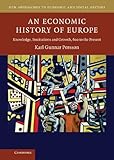An economic history of Europe : knowledge, institutions and growth, 600 to the present / Karl Gunnar Persson.
Material type: TextSeries: New approaches to economic and social historyPublication details: Cambridge, UK ; New York : Cambridge University Press, 2010.Description: xv, 253 p. : ill., maps ; 26 cmISBN:
TextSeries: New approaches to economic and social historyPublication details: Cambridge, UK ; New York : Cambridge University Press, 2010.Description: xv, 253 p. : ill., maps ; 26 cmISBN: - 9780521840095 (hbk.)
- 0521840090 (hbk.)
- 9780521549400 (pbk.)
- 052154940X (pbk.)
- 330.94 22
- HC240 .P467 2010
| Item type | Current library | Home library | Collection | Shelving location | Call number | Vol info | Copy number | Status | Date due | Barcode |
|---|---|---|---|---|---|---|---|---|---|---|
 Libro
Libro
|
Biblioteca Juan Bosch | Biblioteca Juan Bosch | Ciencias Sociales | Ciencias Sociales (3er. Piso) | HC240 .P467 2010 (Browse shelf(Opens below)) | 3 | 1 | Available | 00000098956 |
Includes bibliographical references and index.
Introduction : what is economic history? -- The making of Europe -- Europe from obscurity to economic recovery -- Population, economic growth and resource constraints -- The nature and extent of economic growth in the pre-industrial epoch -- Institutions and growth -- Knowledge, technology transfer and convergence -- Money, credit and banking -- Trade, tariffs and growth / Karl Gunnar Persson and Paul Sharp -- International monetary regimes in history / Karl Gunnar Persson and Paul Sharp -- The era of political economy : from the minimal state to the Welfare State in the twentieth century -- Inequality among and within nations : past, present, future -- Globalization and its challenge to Europe.
"This concise and accessible introduction to European economic history focusses on the interplay between the development of institutions and the generation and diffusion of knowledge-based technologies. The author challenges the view that European economic history before the Industrial Revolution was constrained by population growth outstripping available resources. He argues instead that the limiting factor was the knowledge needed for technological progress but also that Europe was unique in developing a scientific culture and institutions which were the basis for the unprecedented technological progress and economic growth of the nineteenth and twentieth centuries. Simple explanatory concepts are used to explain growth and stagnation as well as the convergence of income over time whilst text boxes, figures, an extensive glossary and online exercises enable students to develop a comprehensive understanding of the subject. This is the only textbook students will need to understand Europe's unique economic development and its global context"--Provided by publisher.


There are no comments on this title.